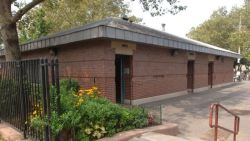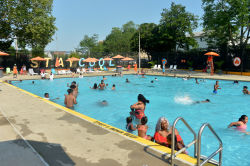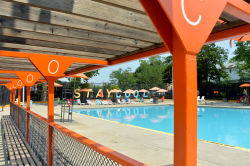Detective Keith L Williams Park
Detective Keith L. Williams Park
Detective Keith L. Williams (1954-1989) was born and raised in this Jamaica, Queens, neighborhood. He attended Jamaica High School, where he played varsity basketball for four years, and Long Island University in Brooklyn. He began his career in the Department of Corrections where he worked until his appointment to the Police Academy in 1981. Williams served in Bushwick’s 83rd Precinct and the Public Morals divisions in South Brooklyn and Queens. He was promoted to detective in 1987 and assigned to the Queens District Attorney’s Squad.
Williams was a dedicated officer and citizen and started the Keith Roundball Classics, a basketball tournament in Liberty Park. He also sponsored an after-school program at P.S. 116. He received two Excellent Police Duty citations and was honored posthumously with the Medal of Honor in 1990. Williams was killed on November 13, 1989, while transporting a prisoner from court to Riker’s Island.
Jamaica, the largest and most densely populated community in central Queens, derives its name from the Jameco (meaning “beaver”) Native Americans, who lived along the shores of what is now Jamaica Bay. In 1655, the first English settlers arrived in Jamaica from Massachusetts and eastern Long Island. Within a year, they secured a land grant from the Dutch Governor Peter Stuyvesant (1610-1672), who had named the area Rustdorp (“rest-town”). Rustdorp soon became the seat of Queens County. On September 8, 1664, the Dutch surrendered their New Netherland holdings to the English.
In 1683, the English governance organized the New York colony into ten counties. Queens County encompassed present-day Queens and Nassau County. The English renamed Rustdorp as the Town of Jamaica; it included all lands south of the present location of the Grand Central and Jackie Robinson Parkways. During the Revolutionary War (1775-1783), the area was predominantly Tory and occupied by British Troops.
Jamaica grew exponentially following the Civil War (1861-1865). Between 1875 and 1910, the population exploded from 780 to 58,200 persons. An electric trolley opened in 1888, but the installation of the elevated subway in 1918 along Jamaica Avenue fostered the rapid expansion of commerce and housing. From 1920 to 1940, Jamaica Avenue became known for its department stores, which possessed the highest street valuations (between 160th and 168th Streets) in all of Queens County. A notable structure on the thoroughfare was the Loew’s Valencia (1929), an extraordinary art deco movie theater that is now used as a house of worship. In 1930, Michael J. Cullen opened King Kullen, the world’s first modern supermarket, on Jamaica Avenue. In April 1937, the Independent Rapid Transit (IRT) line began service, connecting Jamaica with the subways of Manhattan, Brooklyn, and the Bronx.
This parkland was named for Detective Williams in 1991. It had previously been named Liberty Park, for one of the streets that bounds it. The site, also bordered by 106th Avenue and 173rd and 172nd Streets, was acquired by the City in September and November of 1936 by purchase and condemnation. This parkland contains a variety of recreational facilities, including Liberty Pool, four handball courts, two basketball courts, ten tennis courts, a grass baseball diamond, a playground, a spray shower, and the Detective Keith L. Williams Recreation Center. Also included in the park are several sitting areas and a flagpole with a yardarm.
Check out your park's Vital Signs
Clean & Safe
Green & Resilient
Empowered & Engaged Users
Share your feedback or learn more about how this park is part of a
Vital Park System
Contacts
Park Manager: (718) 978-1364
Recreation Center: (718) 523-6912










